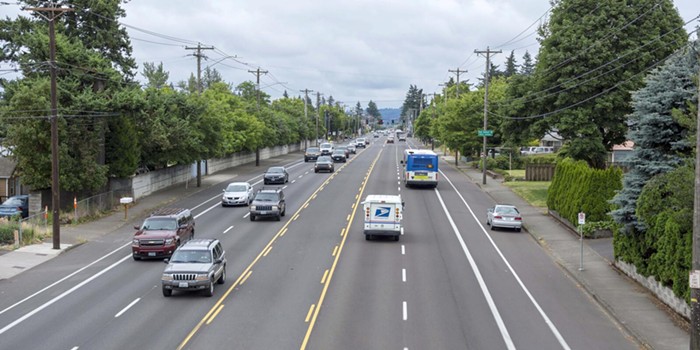Portland commissioners this morning finally made speeches and went on the record with occasionally reticent votes that carved up much of the city's $14.1 million surplus and also swallowed up most of the city's $3 million contingency fund for good measure.
We previewed some of that spending in September, breaking the news about the surplus and brewing plans for how to spend it. Much of that supposition has held up.
• The city today approved $1.7 million in new one-time money for homelessness programs—drawing from its contingency cash—to fulfill part of Commissioner Dan Saltzman's answer to heavy political criticism over Mayor Charlie Hales' camping sweeps this summer.
Suggesting some friction behind the scenes, Saltzman made clear he saw this merely as a one-time request and that he wasn't introducing a Trojan Horse for more ongoing cash. Saltzman's funding plan (pdf)prioritizes families and "vulnerable" people, directing nonprofits to work with cops and others to scour hotspots where people gather.
"We commend the city for making it a priority right now," says Israel Bayer, executive director of Street Roots and a member of the panel that helped Saltzman craft his request. "But there are still questions on the horizon over how we fund this stuff long term."
• About $8 million from the surplus was set aside to pay off two old debts—a computer system and the old city hall remodeling—freeing up $3.5 million in new ongoing money for other priorities next year.
• The council also agreed to tap that new ongoing money to bump up the threshold, to $100,000, before small business owners have to pay taxes on their income. That political sop, pushed by Nick Fish and praised by Amanda Fritz, will cost $865,000 a year. But don't kid yourself about the economic development claims being bandied around. Because guess how much money that gift will stuff back into a business owner's pocket?
A measly $209 on average, according to a review from the city budget office obtained by the Mercury this afternoon.
And as Steve Novick pointed out, reluctantly, also ruing that earthquake preparedness got zero dollars despite the unprecedented surplus, $865,000 is hardly chump change. "That's more than four times the budget for the Buckman Pool," he said, invoking a popular municipal offering that's been on the chopping block every year, only to be rescued magically in the face of outcry from hundreds.
So what didn't hold up? Or what was new?
• The budget adjustment offered some temporary clarity on a flareup first reported by the Mercury: How to pay for streetcar fixes near Portland State University—something that was in danger after the Portland Development Commission warned it might not have money available from its urban renewal area around Portland State University.
The council will allocate some $1.2 million from URA to keep the project moving, and chip in $230,000 more from the city's general fund. But that urban renewal money will come from tax revenue already on hand and not be obtained through revenues raised via bond sales. That suggests Hales is leaning toward pulling the plug on that urban renewal area and reversing his predecessor, Mayor Sam Adams.
He's got a meeting this afternoon with PSU President Wim Wiewel, and it's likely he'll say where he's leaning during that meeting. Hales has mentioned rethinking all of the city's urban renewal districts and he was joined today by Novick, who said pulling the plug on the River District that helped build the Pearl (and could help pay for affordable housing projects near Old Town) would add $8 million to the city's general fund every year starting as soon as 2018.
"We should be moving toward that," Novick said.
That overhaul of urban renewal has Fish worried. Currently 30 percent of urban renewal cash is set aside for affordable housing. As the Mercury revealed, Hales' office has been contemplating several options for managing changes in urban renewal, including some kind of reintegration of the housing bureau and Portland Development Commission.
• The Portland Police Bureau stuck its hand out for more than $1.6 million in new money, much of it adding back positions cut during this spring's budget process. It got none of it. It did, however, get $800,000 for 51 new police cruiser cameras and other related infrastructure. The bureau started adding cameras in 2011.
The bureau's request was unusual, given that seasonal budget adjustments rarely are used to pay for ongoing positions. No other bureau deeply cut made the same request, forcing the mayor or their commissioner in charge to say no like Hales did.

Assistant Chief Mike Crebs, in charge of bureau finances, said Hales never told the bureau not to ask, but did warn it wouldn't happen.
"If you don't ask, you won't get anything," Crebs told me, emphatically batting down any suggestion the bureau was trying to send any messages.
Crebs was in an intense discussion with the city budget office outside the council chambers before the meeting, asking for more money to hire someone to help preside over the camera program. He said the bureau may buy fewer cameras to squeeze out the cash.
• Other requests approved by council included more money for the Office of Neighborhood Involvement's aging programs, pitched by Fritz. The Parks Bureau also will pay down some debt to free up nearly $400,000 a year in new spending on maintenance—for a total of $1 million a year. (Which still pales in the face of a $400 million backlog, Fritz and others noted.) Fritz got more money for tree programs.
And Novick got $30,000 more (though he says the bureau of emergency communications will pay for it) to increase janitorial service at the city's 911 call center.
Overflowing garbage cans, he said, came up quite a bit during a recent staff survey.


















